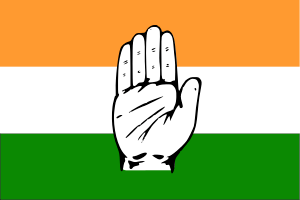National Students' Union of India
| Abbreviation | NSUI |
|---|---|
| Formation | 9 April 1971 |
| Type | Student organisation |
| Legal status | Active |
| Purpose | To empower the student community to create responsible citizens and leaders. |
| Headquarters | 5, Raisina Road, New Delhi |
Membership | About 4.5 Million |
National President | Fairoz Khan |
| Website | NSUI |
| This article is part of a series on the |
| Indian National Congress |
|---|
 |
| About |
| Committees |
| Frontals |
The National Students' Union of India (NSUI) is the student wing of the Indian National Congress, established on 9 April 1971. The organisation was founded by Indira Gandhi after merging Kerala Students Union and West Bengal State Chhatra Parishad to form a national students' organisation.[1]
History
Pre-Independence Movement
Student movement reached its apex during the struggle for independence due to strong participation of students from all sections of the society. Prior to 1950, the student activism of the Indian National Congress were carried out by the youth wing of the AICC.
Post-Independence Movement
The student movement in Kerala and West Bengal gained momentum and resulted in the formation of the West Bengal State Chhatra Parishad and the Kerala Students Union under Congress. On 9th April 1971, a pan Indian students union was floated.
In 2007 Rahul Gandhi changed the electoral process of the Union with open membership process and electing office bearers at all levels. This process allowed young leaders, without political background, to emerge from the grass root.
The organisation maintains a transparent process of membership. The members elect office bearers through an audited process of internal elections that are democratic. NSUI, at present, has registered over 1 million members through open membership. Over 1,30,000 elected office bearers and formed Units in 14500 colleges across the country.
Membership
In order to become the member of NSUI, one must be under 27 years of age, must be a student, must be a citizen of India, must not be part of any other political organisation and must not have been convicted of any criminal activity in past.[2] NSUI categorises its members in to "Primary Members" and "Active Members". An aspiring member who applies for NSUI Membership, becomes a Primary member after the organisation’s scrutiny process.
Activities
- Activism
- For Students' Welfare
- For Gender Sensitivity & Equality
- For Quality in Education
- Against Inequality in Education
- For Freedom of Speech and Expression
- Anti-Drugs Campaigns
- Seminars & Conferences (S&C)
- Lectures
- Panel discussions
- Seminars and conferences (both local and international)
- Study visits
- Institutional visits
- Academic Activities (AA)
- Legal research group
- Essay competitions
- International delegations
Controversies
In 2013, In November, two members of the NSUI were injured by police as they attempted to submit a memorandum to the district magistrate.[3] In late November, the NSUI filed a complain with the police against Madhu Kishwar, a writer who ousted the journalist that had been allegedly sexually assaulted by Tarun Tejpal.[4]